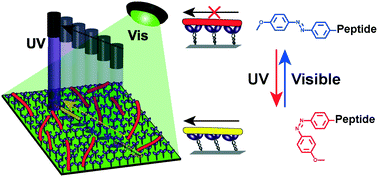Spatiotemporal control of kinesin motor protein by photoswitches enabling selective single microtubule regulations†
Abstract
Artificial control of bio-nanomachines should have a major impact on the development of controllable transport systems for specific cargo transport on chips. Precise spatiotemporal control and local regulation of the bio-motor activity will, however, be necessary if we are to accomplish such a goal. In this study, we exploited the photoswitching properties of azobenzene-based high-energy molecules and inhibitors to control a single kinesin-driven microtubule that has potential to work as a nanocarrier for molecular cargos. In particular, we could influence the local concentration and dispersion of the microtubules at any desired position and time by irradiating a local area of the motility system at one wavelength, while irradiating the entire area at another wavelength, to enrich either cis or trans isomers of photoswitches in the selected region. Furthermore, various regulations (e.g., transporting, bending, breaking) of single microtubules were possible while almost arresting ambient microtubules—all without the need for any surface patterning.

- This article is part of the themed collection: Lab on a Chip Recent Open Access Articles

 Please wait while we load your content...
Please wait while we load your content...